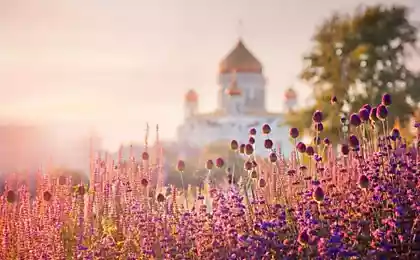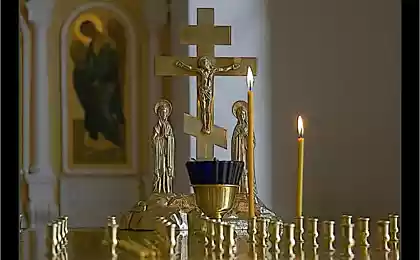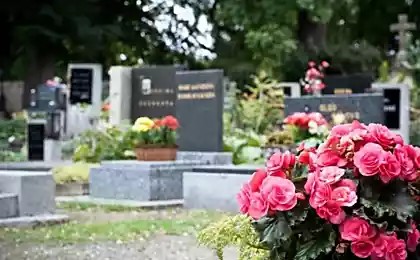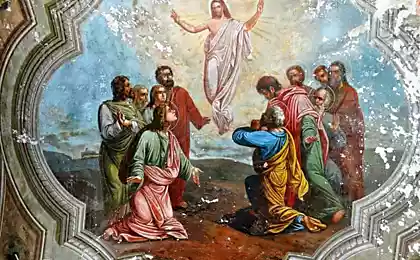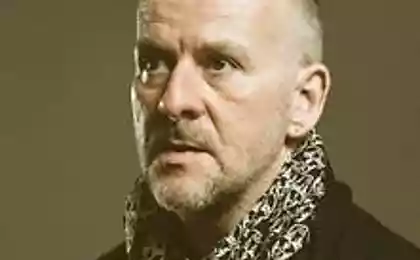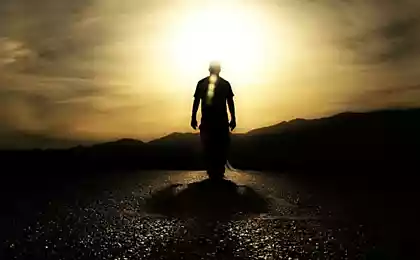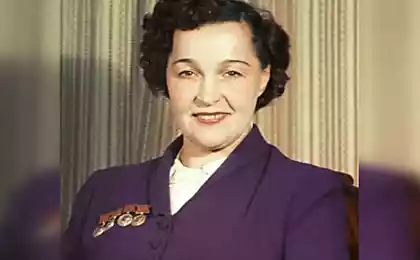624
The history and meaning of the holiday Radonitsa
Radonitsa: 10 may 2016
Most of you will remember, as in many major cities in the Easter holidays, local authorities were allocated the entire bus routes so that people could come to the cemetery. And those who are older, will confirm that even in the years of militant atheism tradition to visit the graves of relatives at Easter piously performed and labourers, and representatives of the then elite.
This tradition was due to several factors: to get to the Church on Easter was hard, in a cemetery on a weekday too, thus people want to combine a Great holiday with the memory of the deceased ancestors. However, this custom of visiting the cemetery on the day of Easter is contrary to the Charter of the Church: during the first Easter week commemoration of the dead actually occurs. If a person dies at Easter, then bury it in a special Passover rite. Easter — time special and extraordinary joy, celebration of victory over death and over every sorrow and grief.
Well, in order that believers could after the end of Easter week to remember deceased loved ones and share with them the joy of the Resurrection the Church has established a special all souls ' day — radonitsu. It has an interesting history and a deep meaning...
Traditionally Radonitsa is celebrated on Tuesday, which follows immediately after Fomin Sunday. It is based on the two previous days) have an annual "peak attendance" of cemeteries and funeral mass.
What is the main idea of this holiday? He came to us in Russia, through what stages of development has passed in the entire history of their existence? And most importantly — what it says about Church, and what elements of the popular version of his celebration does not have the tradition of the Church is irrelevant? Let's try to answer these and many other questions.
Radonitsa: a vestige of the pagan culture
Contrary to popular belief, Radonitsa does not have a purely ecclesiastical origin. It was celebrated by our ancestors even long before Russia became Christian. Its former name — radunica, and its meaning can be understood only having an idea about the archaic beliefs of the Slavs.
Like most ancient peoples, the tribes that inhabited the territory of present Ukraine, Belarus and European part of Russia, did not doubt the existence of the afterlife. Our ancestors believed that after death his soul ascends to the gods and moves into the realm of the dead. However, in contrast to the developed religions of the Middle East and the Mediterranean, the East Slavic paganism does not give supernatural life to any moral traits and did not know such concepts as "hell" and "Paradise". All who have died non-violent death, went to another world, flew in Iry, to the South, in the distant region that the living could visit only birds. There life was certainly different but fundamentally almost no different from what the deceased was doing before his death.
The Kingdom of the dead the way back was not, however, there were certain days in the year, when between two worlds established live connection, and the souls of the previously deceased people could come to their homes to visit their relatives, to participate in their Affairs. Typically, these special periods were in the days of solstices and equinoxes. In addition memorial cycle was also associated with the agrarian calendar, so often the dead are particularly revered either before or after completion of those or other field work.
In honor of the ancestors was supposed to arrange feasts and ritual dinners with copious libations, games, songs, dances, and other elements, which nowadays are called "cultural events". Their goal was simple — to appease the souls of the dead to gain their favor. The fact that the ancient Slavs saw their dead grandfathers-grandfather already not ordinary people, and the spirits that possessed some divine powers. If desired, they could influence the forces of nature or to cause disasters (drought, epidemic, earthquake), or to send various gifts of grace (abundant harvest, warm weather, the offspring of cattle). From the vagaries of the dead depended on the existence of living and therefore live sought in every way to "honor" the souls of their ancestors. It was believed that the rich feast, the fun, the good word about the dead man, praise in his honor, guaranteed the protection of heaven and the welfare of the people.
Radunica was one of those memorial days. More precisely, it was not even a day, and the whole cycle, which lasted about a week and were timed to the arrival of spring. The whole village went into the fields, groves, meadows, zaklikaet spirits. It tried to bring dead joy — a warm word, a respectful treatment. On the graves to honor the dead, pronounced the toast, and the wine poured on the ground. The same is done with food — Slavs believed that brought on the grave food gets to the light, and the ancestors could eat.
In General, all the above rituals successfully survived until our days — and today in cemeteries and homeless cleaners pick up pieces of bread, cookies, candy, cups of vodka, left caring relatives on the graves of relatives and friends. The essence and meaning of these traditions have long been forgotten, but many people still observe them without thinking of their pagan meaning. Not realizing that they contradict Christian doctrine.
Radonitsa: the Christian understanding of the commemoration
Radonitsa – day special vsetserkovnogo souls. Comes from Cavaradossi – after all, Easter lasts for 40 days, and reflects the Christian belief in the resurrection from the dead. In Fomin week remember also the coming of the Lord Jesus Christ into hell, his victory over hell.
Writes SVT. Afansi Sugars ("On all souls under the Statute of the Orthodox Church"), Radonitsa owes its origin to the ecclesiastical rule which lent the commemoration of the dead is transferred on certain days — Saturday. And not accomplished then in the days of Bright week. Charter commemoration can be quite in the first day, when you might be full Liturgy. This day is the Tuesday of St. Thomas week. For the last week of Lent and week Easter to this day always becomes concentrated a lot of memories about the departed. To this rescheduled for Tuesday of Thomas week, the commemoration only some of the names could easily join in the commemoration and their relatives (we now have a tradition in commemoration of one of the deceased, or any deliberate case of joint to remember deceased loved ones and other people). And this memorial to the few dead and their relatives naturally could join in the remembrance and all souls.
According to the testimony of St. John Chrysostom (IV century), this holiday was celebrated in the Christian cemetery from the third century: "what our fathers, leaving a house of worship in cities, installed today come to us out of the city and this is the spot? Because Jesus Christ descended to the dead; and therefore we are going..."
In Russia, as we said above, even before the adoption of Christianity there was a tradition of "spring Wake". The Church for some time struggled with the pagan funerary rites and the cult of ancestors. Eventually, Christianity gave new meaning to the old traditions. The Church has filled them with Christian content.
In General, theology (in contrast to the "omniscient" grandmothers folkloristic) has little to say in the affirmative life after death of the person. This topic has always been a subject of pious speculation, but not of the Council's discussions and Desk research. Christians believe in the immortality of the soul. Believe that a person's earthly life has a major influence on his coming life in the hereafter. Even believers know that we all, according to the word of Christ, will be resurrected in the fullness of time, will receive a new body, and our eternal fate will be determined then finally. Here, perhaps, and all dogmatic postulates, which directly relate to the "hereafter" theme. Then there is already the realm of the living experience of the Church, which has a very different testimony about post-mortem realities. Among them, however, can and should highlight the most important points.
Orthodoxy says that after his death, a person loses very important feature — it can not independently produce a qualitative change. Simply put, he is unable to repent. Of course, crossing the threshold of death, the Christian loses the ability to regret and lament about their errors. But that is not repentance — it is inherent only alive and involves not only the brokenness of sin, but also work on themselves, inward change and the liberation from negative goods which have accumulated during your earthly journey. After death the person no longer has a body, and that means his nature is incomplete, making it impossible for any change.
But what is impossible to man is possible to God. The Church has always believed that between the living and the dead is a very close relationship, and that good deeds have a positive impact not only on living, but have to appease us humans. Our prayers, as evidenced by numerous examples from the lives of the saints, the afterlife fate of the dead can really change. Moreover, the purer we become, the greater the improvement in their condition can get and those about whom we pray. Our purity and our goodness as if passed to others, because we are all — living and dead — are connected like the cells of one organism, a Single Body of Christ — His Holy Church.
Allows the Church to commemorate the dead, but sees this as very different than from pagan feasts meaning. Food is just a form of charity that we do for the sake of the deceased. And it is very important — as we do. Charity, first and foremost, needs us to make kind, merciful, compassionate. And if that happens, then our dead will be much easier on the other side of life. So if dinner was done, they say, to "tick" or "for their" without prayer the dead man, it is unlikely that such a lunch, the deceased will benefit a lot. No glasses of vodka he needs (alcohol, by the way, it is forbidden by the Church at the funeral), and our prayer is sincere, pure, alive. The best place of worship is the temple of God.
Bringing food to the temple, it is also important to remember a few things. In the temple, first of all, pray. Without prayer and left an offering (candles, food, money) are not for the dead of no value. You can bring the mountains, but if this is done without faith and prayers, that will be of little. For us and for the deceased. Except that those in need will be grateful for it. Conversely, if a person has nothing to sacrifice, but he will be praying earnestly for his own or another, this prayer is more valuable than any of the rich offerings. It is important eventually to understand that the Kingdom of heaven can not be bought or sold for any money. The Kingdom of heaven is only achieved by hard spiritual work, and our alms (food in particular) is just one of the elements of such work.
As you can see, Radonitsa two layers — pagan and Christian. Unfortunately, the first one was more understandable to the common man because of its external showiness and lightness in execution. After all, it's quite easy to come to the cemetery to say a few kind words about the deceased, to eat and drink, and then leave part of the dinner at the "probkakh". How much worse is it to pray for the dead and do good deeds in his memory — sincerely, casual, disinterested. But only so and in no other way can we help our relatives, who crossed the Palace of eternity — with love, prayer, good. Otherwise, the cemetery is nothing to walk — still nothing will. Neither in this nor in the next world.
Author: Alexander Detention Of Offenders
Photo by the author. Photo: Smolensk cemetery and the chapel of blessed Xenia. Petersburg, 2011
P. S. And remember, only by changing their consumption — together we change the world! ©
Join us in Facebook , Vkontakte, Odnoklassniki
Source: foma.ru/radonicza-14-maya-v-2013-godu.html
Most of you will remember, as in many major cities in the Easter holidays, local authorities were allocated the entire bus routes so that people could come to the cemetery. And those who are older, will confirm that even in the years of militant atheism tradition to visit the graves of relatives at Easter piously performed and labourers, and representatives of the then elite.
This tradition was due to several factors: to get to the Church on Easter was hard, in a cemetery on a weekday too, thus people want to combine a Great holiday with the memory of the deceased ancestors. However, this custom of visiting the cemetery on the day of Easter is contrary to the Charter of the Church: during the first Easter week commemoration of the dead actually occurs. If a person dies at Easter, then bury it in a special Passover rite. Easter — time special and extraordinary joy, celebration of victory over death and over every sorrow and grief.
Well, in order that believers could after the end of Easter week to remember deceased loved ones and share with them the joy of the Resurrection the Church has established a special all souls ' day — radonitsu. It has an interesting history and a deep meaning...
Traditionally Radonitsa is celebrated on Tuesday, which follows immediately after Fomin Sunday. It is based on the two previous days) have an annual "peak attendance" of cemeteries and funeral mass.
What is the main idea of this holiday? He came to us in Russia, through what stages of development has passed in the entire history of their existence? And most importantly — what it says about Church, and what elements of the popular version of his celebration does not have the tradition of the Church is irrelevant? Let's try to answer these and many other questions.
Radonitsa: a vestige of the pagan culture
Contrary to popular belief, Radonitsa does not have a purely ecclesiastical origin. It was celebrated by our ancestors even long before Russia became Christian. Its former name — radunica, and its meaning can be understood only having an idea about the archaic beliefs of the Slavs.
Like most ancient peoples, the tribes that inhabited the territory of present Ukraine, Belarus and European part of Russia, did not doubt the existence of the afterlife. Our ancestors believed that after death his soul ascends to the gods and moves into the realm of the dead. However, in contrast to the developed religions of the Middle East and the Mediterranean, the East Slavic paganism does not give supernatural life to any moral traits and did not know such concepts as "hell" and "Paradise". All who have died non-violent death, went to another world, flew in Iry, to the South, in the distant region that the living could visit only birds. There life was certainly different but fundamentally almost no different from what the deceased was doing before his death.
The Kingdom of the dead the way back was not, however, there were certain days in the year, when between two worlds established live connection, and the souls of the previously deceased people could come to their homes to visit their relatives, to participate in their Affairs. Typically, these special periods were in the days of solstices and equinoxes. In addition memorial cycle was also associated with the agrarian calendar, so often the dead are particularly revered either before or after completion of those or other field work.
In honor of the ancestors was supposed to arrange feasts and ritual dinners with copious libations, games, songs, dances, and other elements, which nowadays are called "cultural events". Their goal was simple — to appease the souls of the dead to gain their favor. The fact that the ancient Slavs saw their dead grandfathers-grandfather already not ordinary people, and the spirits that possessed some divine powers. If desired, they could influence the forces of nature or to cause disasters (drought, epidemic, earthquake), or to send various gifts of grace (abundant harvest, warm weather, the offspring of cattle). From the vagaries of the dead depended on the existence of living and therefore live sought in every way to "honor" the souls of their ancestors. It was believed that the rich feast, the fun, the good word about the dead man, praise in his honor, guaranteed the protection of heaven and the welfare of the people.
Radunica was one of those memorial days. More precisely, it was not even a day, and the whole cycle, which lasted about a week and were timed to the arrival of spring. The whole village went into the fields, groves, meadows, zaklikaet spirits. It tried to bring dead joy — a warm word, a respectful treatment. On the graves to honor the dead, pronounced the toast, and the wine poured on the ground. The same is done with food — Slavs believed that brought on the grave food gets to the light, and the ancestors could eat.
In General, all the above rituals successfully survived until our days — and today in cemeteries and homeless cleaners pick up pieces of bread, cookies, candy, cups of vodka, left caring relatives on the graves of relatives and friends. The essence and meaning of these traditions have long been forgotten, but many people still observe them without thinking of their pagan meaning. Not realizing that they contradict Christian doctrine.
Radonitsa: the Christian understanding of the commemoration
Radonitsa – day special vsetserkovnogo souls. Comes from Cavaradossi – after all, Easter lasts for 40 days, and reflects the Christian belief in the resurrection from the dead. In Fomin week remember also the coming of the Lord Jesus Christ into hell, his victory over hell.
Writes SVT. Afansi Sugars ("On all souls under the Statute of the Orthodox Church"), Radonitsa owes its origin to the ecclesiastical rule which lent the commemoration of the dead is transferred on certain days — Saturday. And not accomplished then in the days of Bright week. Charter commemoration can be quite in the first day, when you might be full Liturgy. This day is the Tuesday of St. Thomas week. For the last week of Lent and week Easter to this day always becomes concentrated a lot of memories about the departed. To this rescheduled for Tuesday of Thomas week, the commemoration only some of the names could easily join in the commemoration and their relatives (we now have a tradition in commemoration of one of the deceased, or any deliberate case of joint to remember deceased loved ones and other people). And this memorial to the few dead and their relatives naturally could join in the remembrance and all souls.
According to the testimony of St. John Chrysostom (IV century), this holiday was celebrated in the Christian cemetery from the third century: "what our fathers, leaving a house of worship in cities, installed today come to us out of the city and this is the spot? Because Jesus Christ descended to the dead; and therefore we are going..."
In Russia, as we said above, even before the adoption of Christianity there was a tradition of "spring Wake". The Church for some time struggled with the pagan funerary rites and the cult of ancestors. Eventually, Christianity gave new meaning to the old traditions. The Church has filled them with Christian content.
In General, theology (in contrast to the "omniscient" grandmothers folkloristic) has little to say in the affirmative life after death of the person. This topic has always been a subject of pious speculation, but not of the Council's discussions and Desk research. Christians believe in the immortality of the soul. Believe that a person's earthly life has a major influence on his coming life in the hereafter. Even believers know that we all, according to the word of Christ, will be resurrected in the fullness of time, will receive a new body, and our eternal fate will be determined then finally. Here, perhaps, and all dogmatic postulates, which directly relate to the "hereafter" theme. Then there is already the realm of the living experience of the Church, which has a very different testimony about post-mortem realities. Among them, however, can and should highlight the most important points.
Orthodoxy says that after his death, a person loses very important feature — it can not independently produce a qualitative change. Simply put, he is unable to repent. Of course, crossing the threshold of death, the Christian loses the ability to regret and lament about their errors. But that is not repentance — it is inherent only alive and involves not only the brokenness of sin, but also work on themselves, inward change and the liberation from negative goods which have accumulated during your earthly journey. After death the person no longer has a body, and that means his nature is incomplete, making it impossible for any change.
But what is impossible to man is possible to God. The Church has always believed that between the living and the dead is a very close relationship, and that good deeds have a positive impact not only on living, but have to appease us humans. Our prayers, as evidenced by numerous examples from the lives of the saints, the afterlife fate of the dead can really change. Moreover, the purer we become, the greater the improvement in their condition can get and those about whom we pray. Our purity and our goodness as if passed to others, because we are all — living and dead — are connected like the cells of one organism, a Single Body of Christ — His Holy Church.
Allows the Church to commemorate the dead, but sees this as very different than from pagan feasts meaning. Food is just a form of charity that we do for the sake of the deceased. And it is very important — as we do. Charity, first and foremost, needs us to make kind, merciful, compassionate. And if that happens, then our dead will be much easier on the other side of life. So if dinner was done, they say, to "tick" or "for their" without prayer the dead man, it is unlikely that such a lunch, the deceased will benefit a lot. No glasses of vodka he needs (alcohol, by the way, it is forbidden by the Church at the funeral), and our prayer is sincere, pure, alive. The best place of worship is the temple of God.
Bringing food to the temple, it is also important to remember a few things. In the temple, first of all, pray. Without prayer and left an offering (candles, food, money) are not for the dead of no value. You can bring the mountains, but if this is done without faith and prayers, that will be of little. For us and for the deceased. Except that those in need will be grateful for it. Conversely, if a person has nothing to sacrifice, but he will be praying earnestly for his own or another, this prayer is more valuable than any of the rich offerings. It is important eventually to understand that the Kingdom of heaven can not be bought or sold for any money. The Kingdom of heaven is only achieved by hard spiritual work, and our alms (food in particular) is just one of the elements of such work.
As you can see, Radonitsa two layers — pagan and Christian. Unfortunately, the first one was more understandable to the common man because of its external showiness and lightness in execution. After all, it's quite easy to come to the cemetery to say a few kind words about the deceased, to eat and drink, and then leave part of the dinner at the "probkakh". How much worse is it to pray for the dead and do good deeds in his memory — sincerely, casual, disinterested. But only so and in no other way can we help our relatives, who crossed the Palace of eternity — with love, prayer, good. Otherwise, the cemetery is nothing to walk — still nothing will. Neither in this nor in the next world.
Author: Alexander Detention Of Offenders
Photo by the author. Photo: Smolensk cemetery and the chapel of blessed Xenia. Petersburg, 2011
P. S. And remember, only by changing their consumption — together we change the world! ©
Join us in Facebook , Vkontakte, Odnoklassniki
Source: foma.ru/radonicza-14-maya-v-2013-godu.html

